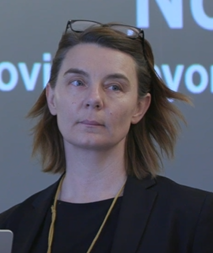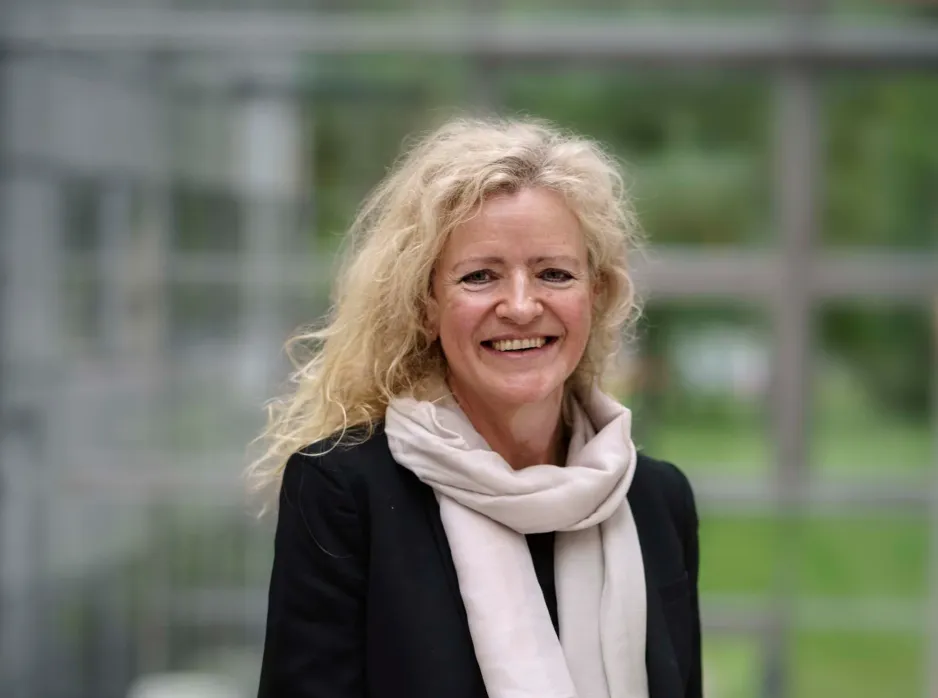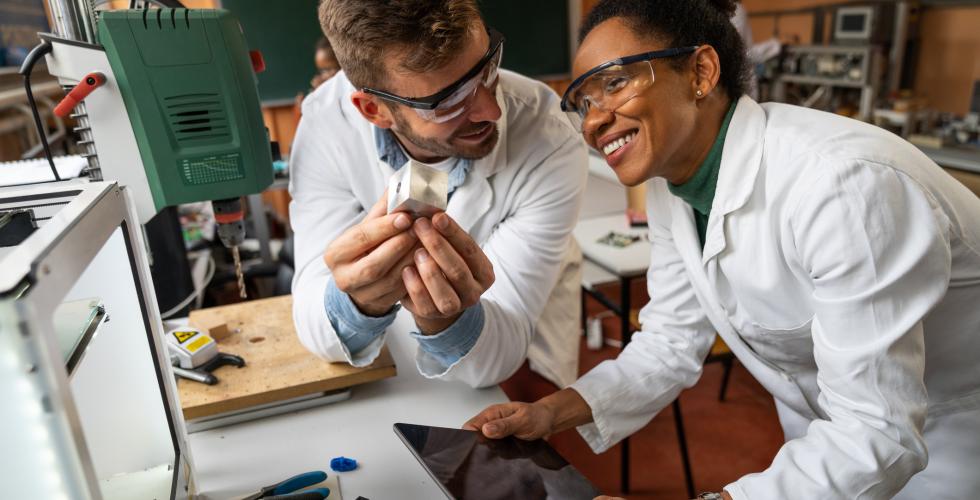Call for measures to combat gender-based violence in academia
“Gender-based violence affects the majority of students and staff in higher education,” according to Fredrik Bondestam from the University of Gothenburg.
“This kind of violence is happening right now as we speak. It's not a question of whether it’s happening,” said Bondestam, Director of the Swedish Secretariat for Gender Research.
He was one of the keynote speakers at the EU conference Ending gender-based violence in academia, which took place at the end of November (see fact box).
See also: Europe gather to discuss gender-based violence in academia

“No more excuses”
After more than fifty years of research into male violence against women and gender-based violence, Bondestam called for action in his keynote speech:
“We have data on prevalence. We also have all the accounts of the brave and bold women, and other minorities, as a result of the #MeToo movement, and in actual fact from when they entered academia.”
Two new surveys on gender-based violence in academia were presented at the UniSAFE conference, and in spring 2022 Sweden issued a report on sexual harassment in academia.
Bondestam referred to accounts of everything from sexist comments to physical abuse and assaults.
“So there are no more excuses for remaining silent, passive, ignorant or even tolerant,” he continued.

Gender-based violence has become a normalised part of academia, according to Sofia Strid, a researcher at the University of Gothenburg. Despite the extensive legislation and policies in place to prevent gender-based violence and to protect victims, she believes that the problem still exists, both in society and in the organisations.
“We know that gender-based violence has a direct impact on both the quantity and quality of research in higher education. We also know that it drives both students and staff out of academia,” said Strid.
Strid believes that gender-based violence is a violation of human rights.
“Gender-based violence can be economic, sexual, psychological, physical, online and offline, and specific forms such as the distribution of images and revenge pornography are also forms of abuse. The violence is part of a much wider system of domination,” she said.
Fredrik Bondestam calls for action to bring about change. He would like to see more than just a change in perspective or looking at gender-based violence in new ways:
“We need a change of plan to combat the violence. Let's move away from passive action plans and instead try to be proactive by developing measures based on the knowledge of people who work directly with victims.”
Bondestam also believes there should be an intersectional approach to violence.
A problem across Europe
A number of people at the conference pointed out that we know a lot about gender-based violence in academia. In spring 2022, the UniSAFE project carried out the largest survey in Europe relating to gender-based violence in academia. A total of 42,000 students and staff at European research institutions responded to the survey.
The recent findings from the survey show that almost two out of three respondents have been subjected to at least one form of gender-based violence since they started working or studying at their institution. Almost one in three respondents had experienced sexual harassment. According to the survey, psychological violence is the most widespread form of violence.
Among the respondents who had experienced gender-based violence, only 13 per cent had reported the incident to their own institution/organisation. Almost half of the victims were unsure whether what they were subjected to was serious enough to merit reporting.
Strid highlighted gender-based violence as a structural problem.
“Gender-based violence is not just a problem for individuals or researchers – it's a problem for the entire European research area,” said Strid, before referring to the UniSAFE survey:
“The work that has been carried out clearly demonstrates that none of the member states have the knowledge, infrastructure, measures or activities in place to gauge the magnitude of gender-based violence, or to prevent, prosecute or reduce gender-based violence in academia.”
When presenting findings from the survey, Zuzana Andreska, a researcher at the Institute of Sociology at the Czech Academy of Sciences (ISAS), was concerned with the great variation across Europe.
“A number of you may come from countries with a raft of policies at your institutions, and may be fed up with the policies either because they're not enforced or simply don’t help. Policies may not be effective on their own, but in some countries, such as the Czech Republic, we don't even have such policies,” Andreska said.
“The research councils of Europe are gatekeepers”
One theme highlighted at the conference was Research Funding Organisations’ (RFO's) role in the work to combat gender-based violence.
“RFOs are key stakeholders and important gatekeepers. The way they approach and promote gender equality in academia and in research – their policies and expectations towards the organisations and researchers they fund – is hugely important,” said Moa Persdotter, Program Manager at Vinnova – The Swedish Innovation Agency, before adding:
“The survey from UniSAFE shows that none of the research councils from the EU's twenty-seven member states have their own action plans to tackle gender-based violence. That needs to change.”
Persdotter chaired a panel (see fact box) on preventing gender-based violence, the importance of action plans, and the implementation of measures. Several of the funding institutions were concerned with which sanctions could be applied in the event that research organisations do not comply with the requirements.
The British research foundation Wellcome Trust has experience of withdrawing funding to organisations that do not comply with requirements,” says Anne Taylor, Associate Director of the foundation.
“We are able to impose sanctions if there are any major changes, such as someone being suspended. In cases where institutions have not informed us, we have prevented them from applying for funds until they comply with our requirements.”
The conference ends with a "Call for action to end gender-based violence ", where one of the recommendations to the RFOs is:
To consider a requirement for institutions to have information in place about action plans and guidelines relating to gender-based violence when applying for research funding.

So what is Norway doing?
Norway is part of the European Research Area (ERA), in which working against gender-based violence is one of five recommendations. Kristin Danielsen, Acting Executive Director for internationalisation and the research system at the Research Council of Norway, explains what the Research Council is doing to tackle gender-based violence in the research sector.
She believes that it is important to focus attention on the issue of gender-based violence.
“Nevertheless, it is our view that research institutions – with employer and personnel responsibility – are primarily responsible for this work,” writes Danielsen in an email.

Ragnhild Hennum, Dean of the Faculty of Law at the University of Oslo and Chair of the Kif committee, writes in an email that the KIF Committee works to combat sexual harassment by means of, among other things, a separate section in the committee's strategy.
“It’s important that the institutions in our sector have zero tolerance for sexual harassment,” Hennum believes.
“What more can the Research Council do to combat gender-based violence in academia, and what needs to happen for the Research Council to prioritise this issue?”
“We continue to contribute to a well-functioning research system, including through the initiative BALANSEpluss, which deals with gender balance, diversity and inclusion. Research environments that want to tackle challenges relating to gender-based violence can apply for funding through the programme to work on this,” explains Kristin Danielsen.
Translated by Allegro Language Services.
The conference Ending Gender-Based Violence in Academia: Toward gender-equal, safe and inclusive research and higher education took place on 24 and 25 November and was organised by the Czech Presidency of the Council of the European Union in Prague.
Anne Taylor, Associate Director of the British research foundation Wellcome Trust, Adrien Braem, Co-chair of the Global Research Council, and Rhonda J Davis, Office Head of the National Science Foundation, USA, participated in the panel discussion "the steering role of RFOs in ending gender-based violence".
Read more about the campaign "Call for action to end gender-based violence".
Watch video recordings of the conference.
See also: The European Commission has proposed a new directive to combat violence against women and domestic violence. The proposal is designed to combat and prevent all forms of gender-based violence, both online and offline.
The EU project UniSAFE (Ending gender-based violence) has issued two reports on gender-based violence in academia. The findings from these reports were presented at the conference.
1) Survey of prevalence: Gender-based violence and its consequences in European Academia
In November 2022, the EU project UniSAFE published the initial results from the largest survey carried out on gender-based violence in academia in Europe.
In the survey, "gender-based violence" is defined as either physical violence or psychological violence, such as abusive comments, unwanted sexual attention, harassment and online violence, or so-called cyberbullying. As the UniSAFE project points out on its website, this broad approach has been chosen to include all forms of violence.
Five of the main findings:
- Students are less affected by gender-based violence than employees, but are more often subjected to physical and sexual violence.
- Women are more often subjected to sexual violence and sexual harassment, while men are more often subjected to physical violence. Non-binary people are more often subjected to sexual harassment, psychological and economic violence.
- Ethnic minority groups experience higher incidences of all forms of gender-based violence
- International employees and students have a higher risk of economic and sexual violence.
- Doctoral students have a higher risk of gender-based violence in general and economic violence in particular.
2) Mapping: Inventory of policies and measures to respond to GBV in European universities and research organisations
The European UniSAFE mapping of action plans and protocols against gender-based violence has been carried out at 45research institutions in fifteen different countries, although not in Norway. As many as 105 plans are being analysed.
According to the mapping, there are two types of recurring action plans. One type is a general plan for equality and diversity and the other type is an action plan focusing on gender-based violence. A number of institutions had plans that were a combination of the two. More than two-thirds of the institutions had action plans for equality, while slightly more than one-third had plans that included measures against gender-based violence. The most common form of violence in the plans was sexual harassment. The same can be seen in Norway.




